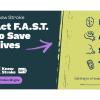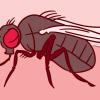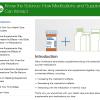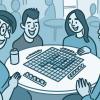Search

Benefits of Counseling During Pregnancy
Pregnant women who have anxiety before childbirth are at increased risk for mental health concerns after the baby is born. Anxiety during pregnancy is more common in areas where mental health resources are scarce. A recent study showed that counseling given by non-specialists could help. The study enrolled more than 750 pregnant women in Pakistan. All the women had symptoms of anxiety but not…

Take Care of Your Voice
Most people have a distinctive voice. We can usually recognize people by their voice even if we can’t see them. But many people don’t think much about their own voice until something goes wrong. Signs of voice problems can include having a hoarse or raspy voice or an achy throat. It may feel hard to talk. Or your voice may suddenly sound deeper. Another sign of trouble is repeated clearing of…

Know Stroke
Stroke is a leading cause of death in the U.S. Spotting the signs and getting treatment quickly can save lives and reduce disability. Signs of stroke can include face drooping, weakness on one side, speech difficulty, sudden severe headache, and sudden trouble seeing and walking. If you see these signs, call 911. Stroke is a medical emergency.

Beyond Basic Blood Tests
Blood courses through your body with every heartbeat. It carries life-giving oxygen to every organ. Blood also helps remove the waste products your body makes. Because it flows to and from every part of the body, blood can provide an important window into what’s happening under the skin. “So many biochemical compounds get absorbed from the tissues of the body into the blood. This makes the blood…, Tracking Cancer, Like normal cells in the body, cancer cells also come into regular contact with blood. This means that substances from tumors, like pieces of [qtip: genes|Stretches of DNA you inherit from your parents that define features, like your risk for certain diseases.] or even whole cancer cells, can get into the bloodstream. Researchers have developed tests to look for such substances in the blood.…, Detecting Alzheimer’s Disease, Like your body, your brain is full of blood vessels. So substances from injured brain cells can also enter your blood. For decades, researchers have been trying to develop blood tests to help diagnose and better treat mental health conditions, explains Dr. John Hsiao, a psychiatrist at NIH. But, this has proven difficult. Blood tests to determine whether someone is at risk for dementias are…, Stay Up To Date, It may be a while before a blood draw at your local clinic can find diseases like cancer or dementia. But keeping up with current blood tests can help you get early treatment for other potentially life-threatening problems. See the Ask Your Doctor box for more.

The Mighty Fruit Fly
Fruit flies can be a major nuisance. How can you help but be annoyed when they hover in swarms over fruits, around picnics, and in garbage? But before you give them a swat, take a moment to be thankful for the common fruit fly. These pests have given scientists surprising insights into how the human body works. Studying flies might seem unrelated to human health. After all, we don’t have wings,…, *Editor's note: This statement contained an error and was updated following publication.

Green Spaces May Improve Kids’ Mental Health
Mental health problems affect millions of children in the U.S. Some studies have found that people with access to parks and other green spaces tend to have better moods and a lower risk of mental disorders. But few studies have looked at whether this is true in children. Researchers studied more than 2,000 kids born between 2007 and 2013. The children came from nearly 200 counties across 41…

Spirituality in Cancer Care and Serious Illness
Spirituality and religion can help many patients and families cope with difficult diseases like cancer. Spirituality is related to the way you look at the world and how you make sense of your place in it. It can include faith, religion, beliefs, values, and reasons for being. The links between spirituality, religion, and health are not well understood. Yet, it often influences important decisions…

How Medications and Supplements Interact
Did you know that taking medications and dietary supplements at the same time can be harmful? It’s important to tell your health care providers about all the drugs and supplements you take. Learn how to avoid problems at this website. You can also test your knowledge about how medications and supplements may interact.

Buffering Childhood Stress
All kids feel stressed from time to time. They may worry about friends, homework, or a big test. Stress is normal. But some kids go through extremely stressful or traumatic situations. These can lead to physical and mental health conditions later in life. Scientists are studying the long-term consequences of early life difficulties. And they’re looking for ways to protect kids from the health…, Stress and Adversity, Many people experience extremely stressful or traumatic situations as children. These are referred to as adverse childhood experiences. Studies estimate about 2 out of 3 adults have had one such experience. And nearly 1 out of 6 adults report four or more. Children who’ve had four or more adverse experiences are at higher risk for chronic health conditions as an adult. These include heart disease…, Protective Relationships, “One of the most important positive childhood experiences is having an adult who cares about you,” says Dr. Caitlin Canfield, a child development researcher at NYU Grossman School of Medicine. “Someone who can help you through stressful situations, or even just through regular life. That could be a parent. But it could be a teacher, a coach, or any adult in a child’s life.” Adults who can model…

When Blood Vessels Grow Awry
Blood vessels wind all throughout your body. They ensure that blood, and the oxygen it carries, reaches all your body’s cells and tissues. Arteries carry oxygen-rich blood from your heart to organs and tissues. Veins carry blood back to your heart to pick up more oxygen. And tiny vessels called capillaries connect the arteries to the veins. But sometimes, the blood vessels don’t grow quite right…
NIH Office of Communications and Public Liaison
Health and Science Publications Branch
Building 31, Room 5B52
Bethesda, MD 20892-2094
Contact Us:
nihnewsinhealth@od.nih.gov
Phone: 301-451-8224
Share Our Materials: Reprint our articles and illustrations in your own publication. Our material is not copyrighted. Please acknowledge NIH News in Health as the source and send us a copy.
For more consumer health news and information, visit health.nih.gov.
For wellness toolkits, visit www.nih.gov/wellnesstoolkits.
